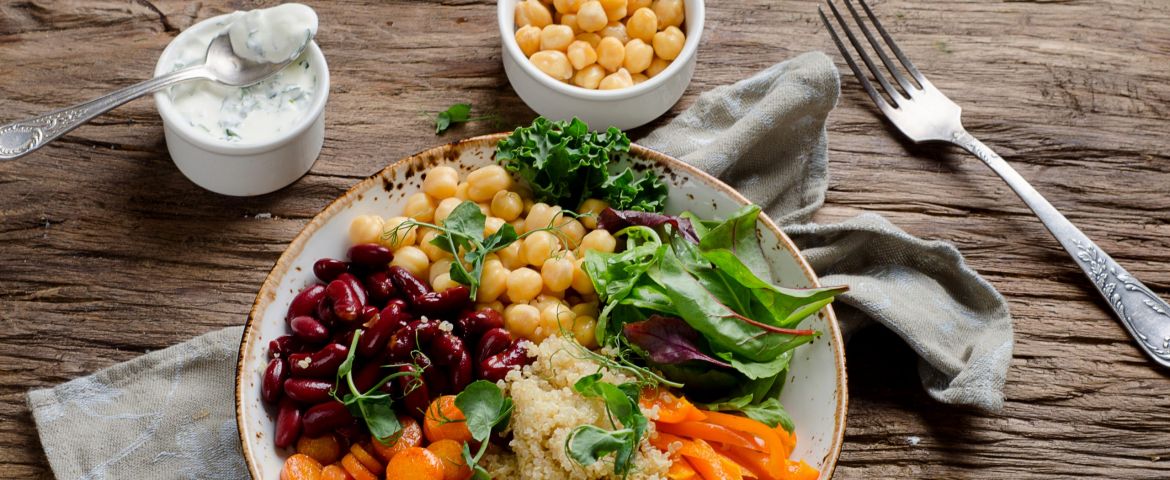While plant-based diets like vegetarianism may seem like a newer trend, the modern vegetarian diet has been around since the mid-1800s. Meatless diets actually started long before recorded history. So, what exactly does it mean to be a vegetarian in today’s world, and what health benefits and challenges does it pose?
Types of Vegetarianism
Simply put, a vegetarian is someone whose diet does not contain meat, poultry or fish. However, this vegetarianism can be further broken down into categories based on what animal products a person consumes.
A lacto-ovo vegetarian consumes eggs and dairy products like milk and cheese. Someone who is an ovo vegetarian would consume eggs, but not dairy products, and a lacto vegetarian will consume dairy products, but not eggs.
There are also partial vegetarian diets where a person doesn’t eat meat but may consume other animal products such as a pescatarian (eats fish but not meat or poultry) or a pollo-vegetarian (eats poultry but not meat or fish). Some people even have what is called a flexitarian diet, where they eat primarily plant-based foods, but incorporate a variety of animal products in small amounts.
Someone may adopt one variation over another based on dietary needs, food preferences, or other personal reasons.
Health Benefits of Vegetarianism
Someone may decide to become a vegetarian for a variety of personal, religious or environmental reasons. Some people begin to consider a vegetarian diet for the health benefits many studies have found it can provide, which include:
- Heart health: Those with a vegetarian diet are at a lower risk of heart disease, tend to have lower cholesterol and are less likely to have a heart attack.
- Reduced risk of metabolic syndrome: A vegetarian diet can be helpful in preventing and treating obesity and Type 2 diabetes.
- Reduced risk of cancer: Cancer can have many different causes and risk factors vary greatly by type and person. However, it has been shown that a plant-based diet may aid in lowering risk for certain types of cancer compared to an animal-based diet.
- Lower blood pressure: Plant-based foods are often lower in sodium, cholesterol and fat —all of which can help lower your blood pressure. Additionally, these foods often have a lower calorie count and could contribute to a lower body weight or weight loss.
As with any diet, food choices are key for achieving health benefits. While you could technically be considered a vegetarian while eating just potato chips and ice cream, you’ll likely not reap the health benefits listed above.
Health Challenges of Vegetarianism
Most of the challenges associated with a vegetarian diet are related to getting the full amount of nutrients your body needs. Vegetarians may have a harder time getting the right amount of protein, vitamin-B12 and omega 3 fatty acids as someone who eats meat. However, there are many options to incorporate these nutrients into your diet in a meatless form:
- Protein: Meatless protein options are plentiful, including eggs, nuts, cheese, milk, tofu, tempeh, beans, lentils and more.
- Vitamin B-12: This vitamin is found in mostly animal based products. For lacto-ovo and lacto vegetarians, this nutrient can be satisfied with milk and cheese. Otherwise, it may be found in fortified nut-based milks, or through a daily supplement.
- Omega-3s: You can find these (healthy) fatty acids in chia seed, flaxseed oil, ground flaxseed and walnuts.
Vegetarian Recipes
Whether you decide to try a full-blown meatless diet or just incorporate a few meat-free meals into your week, check out these delicious recipes:
- Grilled Zucchini Hummus Wrap: Packed with veggies in a warm tortilla, this wrap is sure to be a winner whether you’re looking for a quick lunch or on-the-go dinner.
- Chickpea Chicken Nuggets: Can’t imagine a world without chicken nuggets? You don’t have to with these chickpea substitutes, which may be more delicious than the real deal.
- Crispy Potato Tacos: Taco Bell may have discontinued their potato tacos, but you certainly don’t have to with this delicious homemade take. Here are more alternative taco recipes.
- Tofu Pineapple Marinade Skewers: Shake up any barbecue with these tofu skewers—so good you won’t even miss the meat.
Should I Become a Vegetarian?
Switching from an animal-based diet to plant-based is a big switch and one you should ask your doctor about if you have any concerns. Determine what your goals are from becoming vegetarian and confirm this lifestyle switch will help you get there. Do your research and determine what foods you’ll be eating to get the nutrients you currently receive from animal products.
Not sure you’re ready to give up meat? Try incorporating Meatless Mondays into your meal planning and see how you feel. No matter your diet, consuming more fruits and vegetables and less animal products is something your body, and even the planet, will appreciate.


